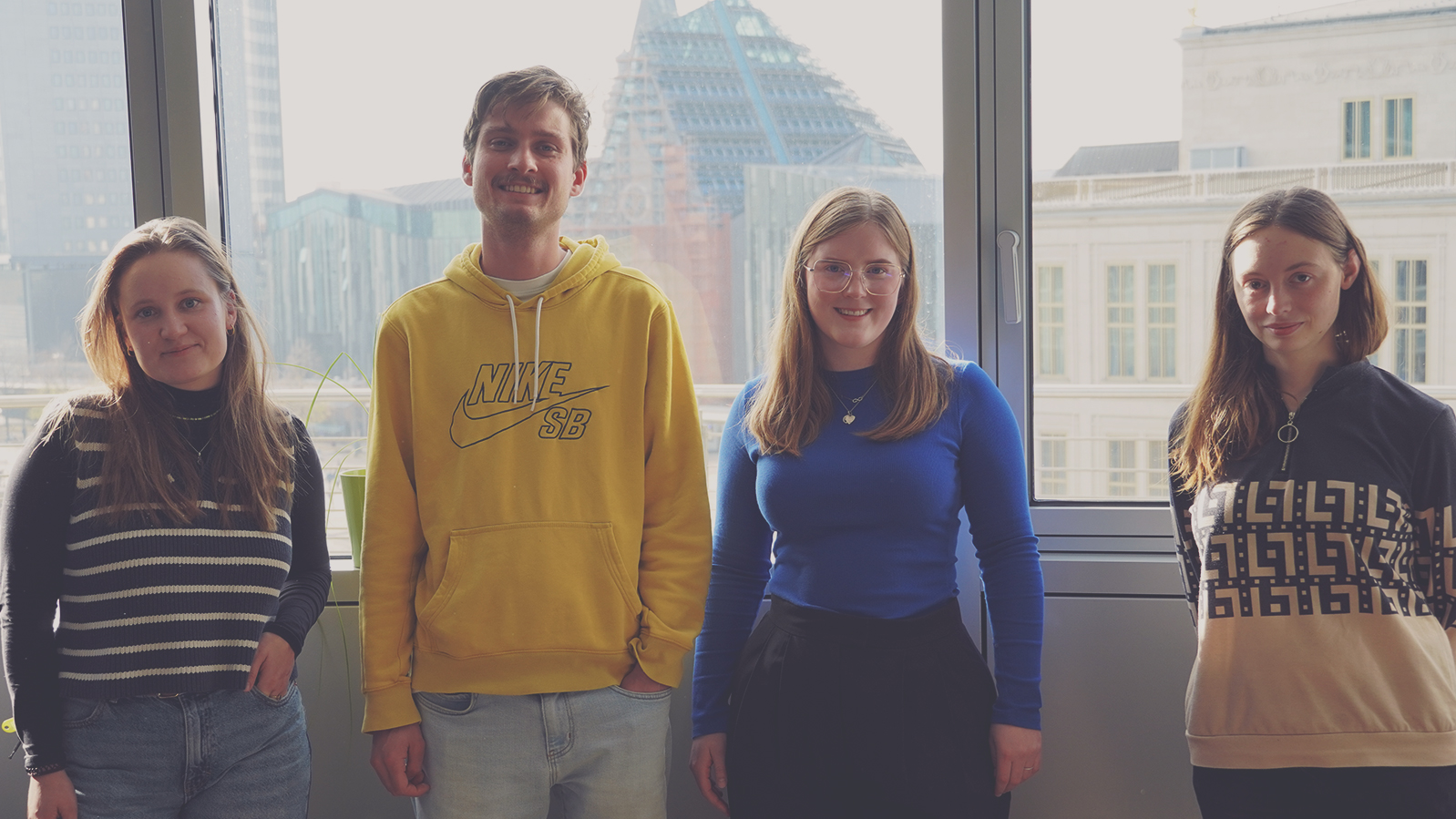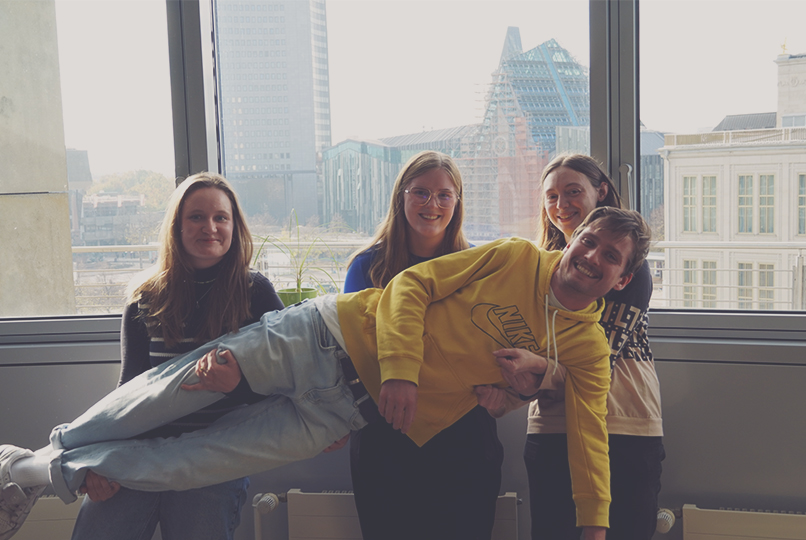
For many students, their start in professional life begins during their studies - as working students. They gain valuable practical experience, actively contribute to the success of companies and build up a professional network even before graduation is within reach.
At IT Sonix, there are plenty of opportunities to gain practical experience during your studies. Whether in software development, HR or user experience design (UXD) - as working students, young people can apply their theoretical knowledge directly to exciting projects. And that's not all: with their fresh ideas and commitment, they also provide additional momentum for the company.
IT Sonix also attaches great importance to knowledge transfer. We promote dialogue with universities, regularly offer guest lectures and have an academic speaker who supports the transfer of knowledge between research and practice.
Curious to find out what everyday life is like as a working student at IT Sonix?
Let's take a look behind the scenes together: Our working students share what they experience at IT Sonix, which projects drive them forward and how they develop personally and professionally in the process. It's about their learning processes, the challenges they overcome and the successes they celebrate.
These insights show: It pays to gain practical experience at an early stage. If you are curious about what working at IT Sonix is like and would like to become part of a dynamic team, you may find the impetus to apply here. The opportunities are there - the first step is up to you. So stay tuned and be inspired!
Our interview series kicks off with Anton, one of our software development working students, and Josi, a working student in our HR department.
Hello, who are you, what are you studying and in which semester?
Anton: Hi, I'm Anton and I'm studying computer science in my 4th master's semester.
Josi: Hi, I'm Josi and I'm studying Educational Science in my 7th semester. I will be writing my Bachelor's thesis this semester.
What does a typical working day look like for you?
Anton: I arrive at work and the first thing I do is plug in my laptop, if I had it with me at home. While it starts up, I get myself a coffee. Then I start up all the programs and go through my emails, which tend to pile up as I don't work every day of the week as a student trainee. Once that's done, I open the Kanban board and see what tasks are pending and then work on them accordingly.
Josi: My working week always starts in the office on Wednesday. I usually start at around 7.30 a.m. and get myself a coffee first. Then I read my emails and answer messages. This then results in various tasks that I have to complete throughout the day. Apart from that, the Dailies and the Weekly are fixed appointments in my working day.
Why did you choose IT Sonix as your employer and how did you hear about us?
Anton: I needed a job when I started my Master's degree so that I could continue to finance my studies. Accordingly, I searched for suitable jobs on LinkedIn and Xing and came across a job advert from IT Sonix. I applied to several companies and in the end, IT Sonix was the quickest to make a decision. To be honest, I didn't know at first how long I wanted to or would stay, but I joined a very good team and was given a great induction. That's why I'm still here now.
Josi: I had already heard a lot of good things about IT Sonix in advance and was able to get to know the company better through my immediate family and a university project. I registered for the stem cell donation programme with two other students, which gave me a first impression of the employees. Through these contacts, I learnt about the working student position in HR and decided to apply, as the position offered me many new challenges.
How does the company support you in combining your studies and your job?
Anton: It was clearly signalled to me right from the start that I could work in a way that suited my studies. The company also made the compromise that I could start with 16 hours instead of the 20 hours typical of a working student. In the meantime, however, I have begun to work 20 hours because it fits in better now. Spontaneous schedule changes frequently occur due to appointments with professors, for example, and this is no problem as long as the team is informed. Additionally reducing hours during the examination phase is similarly unproblematic.
Josi: The company supports me in the sense that I am not tied to core working hours and can therefore work flexibly. This makes it easy to combine my studies and work. I also receive a lot of understanding regarding events and appointments at university. I always have the feeling that my studies still come first, despite my job.
What is the coolest thing about your job as a working student?
Anton: From a developer's perspective, the coolest thing is definitely working with technologies and in large projects, as this is unfortunately not possible to the same extent during my studies. Personally, I would say it's the people and the atmosphere in my job. There are always opportunities for jokes and little breaks, which loosen up the daily routine and make it possible to bond with each other in a different way.
Josi: It might sound like I'm trying to suck up, but it's actually my colleagues and especially my team.
Is there an interesting project you're currently working on?
Anton: I find the AI Circle I work in extremely exciting. We are developing (among other things) a chatbot that accesses our internal information sources and thus enables our employees to write specifically about company-specific topics.
Josi: I have been given the opportunity to take part in a hackathon with a team. I will be able to take on a completely new role there, which I am currently preparing for. Apart from that, I'm really looking forward to the upcoming WUD, where I'll be providing support.
What are your favourite programming languages to work with?
Anton: My favourite languages to work with are Java and Python.
To what extent does the practical experience you gain here help you in your studies?
Anton: I also have quite a few practical projects during my studies, but the big difference is working on a real project and product, where you can gain real work experience. Because it's really about the project business, there is always ‘real’ responsibility involved, unlike at university. The practical exercise has particularly helped me develop my technology skills, because I get a lot more practice and am therefore better familiarised with the topics.
Josi: The experience has helped me in that I have clearly realised that I can express myself better by taking part in the trade fairs and conducting job interviews. The practical experience is also helping me to improve my time management between my studies and work, as I now have a regular daily and weekly routine.
Do you already have ideas for your professional future and has your time as a working student here perhaps also had an influence on this?
Anton: I had a software project during my studies where I was able to take on the role of product owner. I really enjoyed that and I could imagine trying out the role in a professional context later on. My time as a working student helped me to realise that I can take on real responsibility.
Josi: During my studies, I realised that I don't want to work in the socio-educational field at the moment, as I really enjoy working in HR. I would like to build on my experience at IT Sonix and stay in HR.
What experience did you already have here before the work-study programme? Have you been able to develop/advance this experience?
Anton: Throughout my studies, I worked with Java and spring and developed multiple projects with these technologies. This made my start as a working student easier because these are the technologies that are also used here. Aside from that, I also attended two modules on question answering and chatbots during my Master's degree in relation to the aforementioned Circle initiative and also read a lot about AI. This helped me in my dialogue with my colleagues in particular, and helped avoid communication problems.
Do you have any tips for other students who are thinking about applying for a position here?
Anton: I can only tell other students that if you want to learn software development practically and gain work experience, IT Sonix or a work-study programme here is definitely a good place to go. Also, a tip that I have used would be: If you break your arm before the technical interview, you don't have to program anything. :)
Josi: Since it is very likely that I would be reading your application, it probably makes the most sense to give tips on this. Therefore: please always remember to send your CV and at least the current transcript of records from your studies, as well as the Imma certificate. Apart from that, my advice is that you shouldn't be too afraid to apply if you can't do this or that yet. As a student, (almost) nobody expects you to be able to do everything.
